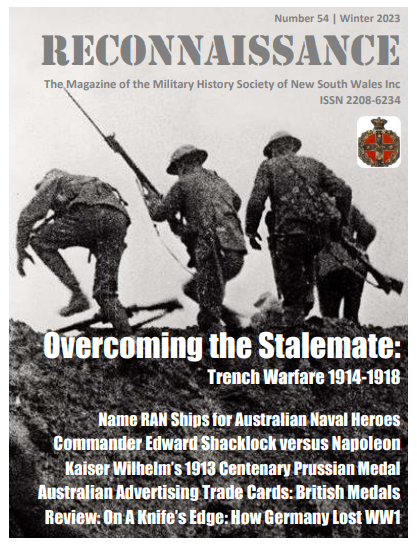From the Editor - Reconnaissance Winter Issue 2023
Winter 2023 Issue of Reconnaissance, the quarterly magazine of The Military History Society of New South Wales
Welcome to the Winter 2023
issue of Reconnaissance.
At
the end of this year’s Anzac Day season David Martin presented a lecture to our
Society’s May meeting on the topic: “The British Army’s Steep and Bloody
‘Learning Curve’: which facilitated the AIF becoming such an effective fighting
force on the Western Front in 1918”. This addresses the most contentious
question emerging from World War I studies over recent decades. Lined up on
opposing sides of the question are those who insist that Britain’s conduct of
the war was a bloody saga of incompetence ended by American intervention and
those who argue that by dint of persistence and ingenuity the British
ultimately prevailed over unprecedented difficulties to fashion a formidable
war machine capable of crushing the German Army.
For
this issue of Reconnaissance, Dr Martin returns to the central question
but this time focuses on the tactical and technological side of the British
Army’s grueling advance to victory. He pays less attention to the
historiographical disputes between leading writers in the field or the Australian
Army’s progress in the war. It is hard not to conclude, on reading Dr Martin’s
thorough account of the succeeding tactical experiments and technological
innovations, that the British Army did indeed scale ‘a learning curve’ and gain
strategic dominance over the Germans.
The
next two articles in this Reconnaissance relate to aspects of naval
history. Leading Australian military historian Dr Tom Lewis OAM wonders why the
Royal Australian Navy has less of a tradition of naming warships after naval heroes
and prominent national figures than the Royal Navy and especially the United
States Navy. He nominates some under-appreciated Australian naval heroes and
suggests that naming the next available RAN vessels after them would be a great
way to further recognise their outstanding service.
The
second naval article, by Dr Andrew Wilson, is a historical profile of a
relatively unknown but fascinating British commander of the Napoleonic era.
Lieutenant Edward Shacklock had a varied career spanning most categories of
maritime service and naval vessels. He started off as a lowly merchant mariner
plying trade routes from the Mediterranean to the Caribbean, constantly at risk
of French attack and plundering. At one point he was taken prisoner by a French
privateer. Having witnessed Nelson’s triumph at Copenhagen in 1807 he was
attracted to a military role, first as a privateer seizing French prizes and
later pressed into service with the Royal Navy. He went on to play an active
role in the British flotilla operating around Cadiz during the Peninsular
Campaign.
In
this issue we have two interesting pieces on militaria. Dr John Haken profiles
Australian Advertising Trade Cards which at one time were popular collector’s
items featuring aspects of the popular culture. Dr Haken provides a tabular
presentation of trade card series featuring British and Commonwealth military
medals and awards. Dr Andrew Wilson writes up an account of Kaiser Wilhelm’s
1913 Prussian Centenary Medal struck to commemorate the victory over Napoleon
at Leipzig in 1813, part of the Kaiser’s attempts to raise his flagging
popularity.
Finally, we have an excellent review by Dr David Martin of a book on a subject related to his cover feature, Holger Afflerbach’s On A Knife Edge: How Germany Lost the First World War.
As always, if you are interested in contributing an article or review to Reconnaissance, please feel free to contact me at any time. I hope you enjoy the magazine.
Editor,
Reconnaissance
The magazine is available to members of the Society, instructions on how to join can be found on our website here.

.png)
.png)

Comments
Post a Comment